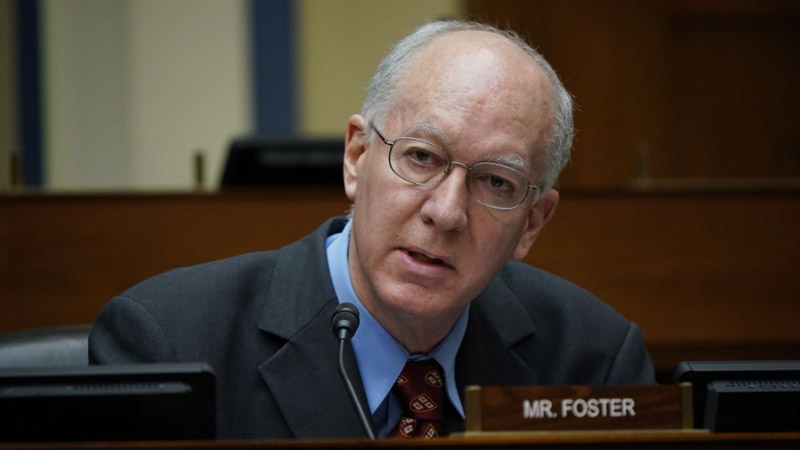Several Democrats praised digital ID and CBDCs during a recent hearing.
During a recent House Financial Services Committee hearing, several government officials shared updates on their work on digital ID and central bank digital currencies (CBDCs) — two types of technology that have the potential to give the government unprecedented levels of control and surveillance power.
Several Democrats also praised these technologies and criticized lawmakers who are pushing legislation that would shut down CBDCs.
Digital IDs received an enthusiastic endorsement from Rep. Bill Foster (D-Il), who positioned them as a way to mitigate the risks of artificial intelligence (AI). He also praised digital ID systems in other countries, such as India, Estonia, and Korea.
“A secure digital ID biometrically synced to your smartphone allows individuals to remotely verify that they are who they say they are, saving costs, reducing likelihood of fraud, and to allow individuals to defend themselves against deep fake identity fraud,” Foster said.
He continued by asking the witnesses whether digital ID would have been beneficial during Covid and whether using digital ID for online transactions would be beneficial.
Democrat Lawmaker Pushes for “Secure Digital ID Biometrically Synced to Your Smartphone”
Several Democrats praised digital ID and CBDCs during a recent hearing
Digital IDs received an enthusiastic endorsement from Rep. Bill Foster (D-Il), who positioned them as a way to mitigate… pic.twitter.com/Eb41YOTJce
— Camus (@newstart_2024) December 16, 2023
While Foster seemed to be a fan of India’s digital ID system, he didn’t mention any of the many controversies swirling around it, which include large-scale privacy issues, the financial blacklisting of those who refuse to participate, and the enforcement of checkpoint-style digital ID authentication in certain areas of society.
Foster also positioned the digital IDs in India, Estonia, and Korea as optional, saying that these countries “provide citizens who wish with a secure form of digital identification that can be presented online.”
But in Estonia, citizens don’t get to choose whether they use digital ID. Before they even have a name, babies are plugged into the system and given an identity code.
Charles Vice, Director of Financial Technology and Access, National Credit Union Administration (NCUA), also discussed digital ID.
He told lawmakers that his agency is evaluating digital ID technology, noted that several credit unions have piloted digital ID, and praised the mobile digital driver’s licenses that have rolled out in several US states.
Rep. Stephen Lynch (D-MA) turned the focus to CBDCs and warned that “the US should not risk falling behind” other countries with its CBDC exploration.
He also complained that “many of my colleagues on this subcommittee want regulators to encourage innovation, yet are pushing legislation that shuts down a CBDC before agencies have adequately researched and explored it.”
Although Foster criticized lawmakers who are against CBDCs, he failed to mention why these lawmakers have concerns about this technology.
Some of the points of contention among lawmakers pushing anti-CBDC bills are that CBDCs could pave the way for increased surveillance of citizens’ transactions and be programmed to restrict purchases and dictate what people can buy.
Rep. Warren Davidson (R-OH) took a more skeptical tone when he questioned Michael S. Gibson, Director of the Division of Supervision and Regulation at the Federal Reserve, about CBDCs.
He focused on the San Francisco Fed and Boston Fed hiring for CBDC development roles and pressed Gibson on the nature of the Federal Reserve’s CBDC research and whether this research is evolving into something more expansive.
“You hire people that write code, it starts seeming like you’re developing and building versus researching,” Davidson said.
However, Gibson insisted that it’s solely a research effort and that the Federal Reserve is “a long way off from the thinking about implementation of anything related to a CBDC.”
The Digital Dollar Dilemma: The Implications of a #CBDC
Full statement of U.S. Congressman Stephen Lynch @RepStephenLynch on the creation of a U.S. digital dollar (CBDC). 👇🏼#HBAR #XLM #XRP pic.twitter.com/4ng7SSd9nL
— Subjective Views (@subjectiveviews) September 14, 2023
The divide between Democrats and Republicans during this hearing is reflective of the larger clash in political party ideologies that has manifested during the wider debate on these technologies.
Republicans are generally skeptical of these technologies, recognize their terrifying potential, and have introduced various bills that would restrict or ban them. Democrats, on the other hand, have framed these technologies as innovative and are pushing for legislation that would accelerate the implementation of digital IDs and CBDCs.


